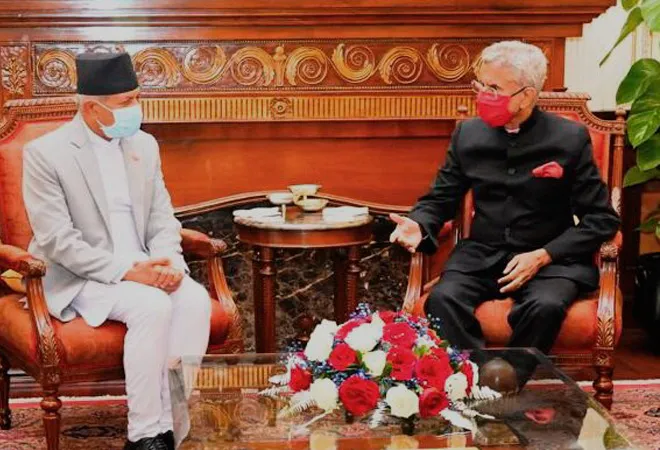-
CENTRES
Progammes & Centres
Location

The sixth meeting of the India-Nepal Joint Commission, co-chaired by Indian External Affairs Minister S. Jaishankar and his Nepalese counterpart Pradeep Kumar Gyawali, was held on 15 January 2021 in New Delhi. As the Nepalese delegation, comprising the Foreign Minister, Foreign Secretary Bharat Raj Paudyal and other senior officials visited India, the world kept a keen eye on the probable developments, after the cold demeanour of the recent past over the border row.
As mentioned by the spokesman for India’s Ministry of External Affairs (MEA), Anurag Arivastava, the primary vision of this meeting lay in having constructive discussions on the bilateral relationship between the two countries, that has indeed been taking the test of time and implement constructive measures for the future.
Commencing way back in 1987, the Joint Commission is predominantly a bilateral mechanism at the level of the Foreign Ministers ‘with a mandate of reviewing the entire spectrum of Nepal-India bilateral relations’. As a matter of fact, it is the multifaceted cooperation between the two countries that has enjoyed ‘a special and unique relationship rooted in shared heritage, civilization, culture and extensive people-to-people relations’. Various facades of cooperation in areas ranging from connectivity, economy and trade, energy cooperation, water resources, border management and tourism to education and capacity building, come under the canopy of this interaction.
The meeting came at a time when the entire first half of 2020 was spent in constructing and theorising a new foreign policy approach to break the ice after Nepal made serious allegations about India allegedly encroaching upon its territories, and redrew the nation’s map overnight through parliamentary legislation, unilaterally. At the same time, the Himalayan country is also reeling under deep political turmoil as the governing Nepal Communist Party (NCP) split into two -- one led by Prime Minister K. P Sharma Oli and the other by NCP Chairman Pushpa Kamal Dahal and Madhav Nepal. Given this background, what interaction Nepal has with India will be interesting to note as claims of India influencing the upcoming Nepalese elections, for its own regional security, scheduled for April 30 and May 10 have been quite ripe.
The Joint Commission meeting is one of the first major visits of Nepal after the Covid-19 pandemic, though India has had made a fair share of diplomatic visits to the northern neighbour. Given the need of the hour, the Covid-19 and its necessary preventive mechanisms across the border with an active Track-1 reciprocity was a special emphasis that undoubtedly required better tone between the two countries.
The Joint Commission meeting is one of the first major visits of Nepal after the Covid-19 pandemic, though India has had made a fair share of diplomatic visits to the northern neighbour
Inevitably, this is also seeming to be one of the foremost reasons behind the more or less loosened diplomatic approach of Nepal towards India, which was way more stringent in 2019 after the first political map with Kashmir and Ladakh as states had been released with the mention of Lipulekh, Kalapani and Limpiyadhura.
Nonetheless, Nepal has already received one million doses of the covid-19 vaccines under the special grant assistance in sync with the ‘Neighbourhood First Policy’ of India. A special Air India aircraft was also designated for the same, following which the vaccines were unloaded at the Tribhuvan International Airport and then taken to a health facility at Teku, in the outskirts of Kathmandu, as per the norms of the Health Ministry.
Prime Minister Oli also thanked Indian counterpart Narendra Modi for the making the entire scenario of health diplomacy an important cornerstone of fixing the past issues of ambiguity and apprehension.
Apart from this, other issues of connectivity like milestone achieved by the Motihari-Amlekhganj petroleum products pipeline and discussions on extending the pipeline to Chitwan and the establishment of a new pipeline on the eastern side connecting Siliguri to Jhapa in Nepal were made. Both sides also welcomed the completion of the work on first passenger railway line between India and Nepal from Jaynagar to Kurtha via Janakpur, and noted that operating procedures for commencement of train services were being finalized. Other cross-border rail connectivity projects, including a possible Raxaul-Kathmandu broad gauge railway line, also found its way to the discussion.
The Joint Commission recorded the need to facilitate cross border movement of people and goods. Mention of the recently inaugurated Integrated Check Posts at Birgunj and Biratnagar was also made that have helped in seamless movement of people and trade between the two countries. Both sides welcomed the commencement of construction of third ICP at Nepalgunj. India conveyed that construction of new ICP at Bhairahwa would be initiated shortly.
The Joint Commission recorded the need to facilitate cross border movement of people and goods. Mention of the recently inaugurated Integrated Check Posts at Birgunj and Biratnagar was also made that have helped in seamless movement of people and trade between the two countries
Discussions were held on expediting joint hydropower schemes, including the proposed Pancheshwar Multipurpose Project, which have numerous benefits for the people of both countries. India conveyed that it would undertake two more cultural heritage projects in Nepal, namely, the Pashupatinath Riverfront Development and the Bhandarkhal Garden Restoration in Patan Durbar, with grant assistance. Views on international, regional and sub-regional cooperation were also exchanged. Nepal also extended support for India’s permanent membership of an expanded UN Security Council to reflect the changed balance of power. Both sides agreed to hold the next meeting of the Joint Commission in Nepal on mutually convenient dates.
Even though there has been no concrete resolution to the border dispute, acknowledgment of the prevailing state of affairs has made the situation better. All in all, the meeting seems to have gone well in good faith, for the days to come as two geographically contiguous neighbours have no alternative but to restore the trust that must prevail. This is all the more crucial for India as Nepal still remains in the good books of China and vice versa, that holds within itself the potential of tilting the geopolitical dynamics of the region at any given time.
The views expressed above belong to the author(s). ORF research and analyses now available on Telegram! Click here to access our curated content — blogs, longforms and interviews.

Sohini Nayak was a Junior Fellow at Observer Research Foundation. Presently she is working on Nepal-India and Bhutan-India bilateral relations along with sub regionalism and ...
Read More +